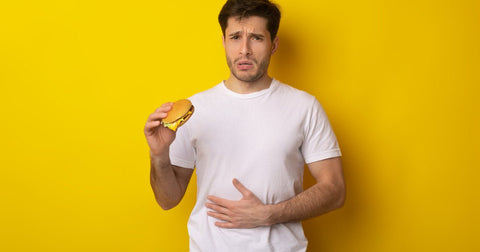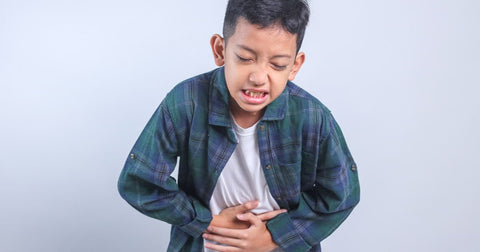Constipation is a common digestive issue that affects millions of people worldwide. It is characterized by infrequent bowel movements, difficulty passing stools, and a general sense of discomfort in the abdomen. For many, the question arises: should you eat when constipated, or will eating exacerbate the problem? Understanding how diet impacts constipation is crucial for managing this condition effectively.

This article delves into the relationship between eating and constipation, exploring whether consuming food can help or hinder bowel movements. We'll discuss the types of foods that can alleviate constipation, those that may worsen it, and additional tips for maintaining digestive health. By the end, you'll have a clearer understanding of how to adjust your diet to manage constipation better.
Understanding Constipation
Constipation is a condition defined by the infrequent or difficult passage of stools, often accompanied by discomfort or a feeling of incomplete evacuation. It can vary in severity from mild to chronic, with symptoms lasting from a few days to several weeks or longer.
Common Causes

- Dietary Habits: A diet low in fiber and high in processed foods can contribute significantly to constipation. Fiber is essential for adding bulk to stools and promoting regular bowel movements.
- Lack of Physical Activity: Regular physical activity stimulates intestinal contractions, helping move stool through the digestive tract.
- Dehydration: Adequate fluid intake is vital for softening stools. Dehydration can lead to hard, dry stools that are difficult to pass.
- Medical Conditions: Certain medical conditions, such as irritable bowel syndrome (IBS), hypothyroidism, and diabetes, can interfere with normal bowel function and contribute to constipation.
- Medications: Some medications, including painkillers, antacids containing aluminum or calcium, and certain antidepressants, can cause constipation as a side effect.
Symptoms
- Infrequent Bowel Movements: Having fewer than three bowel movements per week is a common sign of constipation.
- Hard or Lumpy Stools: Stools that are hard, dry, or lumpy can indicate constipation.
- Straining: Excessive straining during bowel movements is often associated with constipation.
- Abdominal Discomfort: Bloating, cramping, and a feeling of fullness are common symptoms.
- Feeling of Incomplete Evacuation: A persistent sensation that not all stool has passed can be a frustrating symptom of constipation.
Diet plays a crucial role in maintaining healthy bowel movements and preventing constipation. What you eat can either aid or hinder your digestive process. One of the primary dietary factors influencing constipation is fiber intake. Fiber, a type of carbohydrate found in plant-based foods, adds bulk to stool and helps it pass through the intestines more easily. There are two types of fiber: soluble and insoluble. Soluble fiber dissolves in water and forms a gel-like substance, which can help soften stools. Insoluble fiber, on the other hand, adds bulk to the stool and helps it move more quickly through the digestive tract.
Inadequate fiber intake is a common cause of constipation. The recommended daily fiber intake is about 25 grams for women and 38 grams for men. However, many people fall short of this amount, leading to harder and less frequent stools. Including a variety of fiber-rich foods in your diet, such as fruits, vegetables, whole grains, and legumes, can significantly improve bowel regularity.
Hydration is another critical aspect of diet that affects constipation. Water helps to soften stools, making them easier to pass. When you do not consume enough fluids, the body absorbs more water from the waste in the colon, leading to harder, drier stools. It is recommended to drink at least eight glasses of water a day to maintain proper hydration and support digestive health.
Should You Eat When Constipated?

A common misconception is that you should avoid eating when constipated. However, maintaining regular meals is essential for stimulating bowel movements and preventing further digestive issues. Eating triggers a reflex that stimulates the colon, known as the gastrocolic reflex, which can help promote bowel movements.
Skipping meals can actually worsen constipation. When you skip meals, your digestive system slows down, and the lack of regular stimulation can lead to even less frequent bowel movements. Therefore, it is important to continue eating regular, balanced meals even when you are constipated.
Moreover, the type of food you consume when constipated is crucial. Opt for meals that are high in fiber, as this will help add bulk to your stool and make it easier to pass. Additionally, eating foods that are known to promote digestion, such as fruits, vegetables, and whole grains, can further aid in relieving constipation.
It's also important to stay hydrated while maintaining your regular meals. Drinking plenty of water throughout the day can help keep the digestive system moving smoothly and prevent stools from becoming too hard.
Recommended Foods to Eat When Constipated
When dealing with constipation, certain foods can help stimulate bowel movements and relieve discomfort. Incorporating these foods into your diet can provide the necessary fiber, hydration, and beneficial bacteria to support digestive health.
High-Fiber Foods
Fiber is essential for adding bulk to stool and promoting regular bowel movements. Foods rich in fiber include:
- Fruits: Apples, pears, berries, and citrus fruits are excellent sources of fiber. Prunes, in particular, are well-known for their natural laxative effect due to their high fiber and sorbitol content.
- Vegetables: Leafy greens like spinach and kale, as well as broccoli, Brussels sprouts, and carrots, are high in fiber and can help ease constipation.
- Whole Grains: Opt for whole grains such as oatmeal, brown rice, quinoa, and whole wheat bread. These grains provide significant fiber, which aids in digestion and prevents constipation.
Probiotic-Rich Foods
Probiotics are beneficial bacteria that promote gut health and can help alleviate constipation. Foods that are rich in probiotics include:

- Yogurt: Look for yogurt that contains live and active cultures. These probiotics can help maintain a healthy balance of gut bacteria, improving digestion and regularity.
- Kefir: This fermented milk drink is packed with probiotics and can be more potent than yogurt in promoting bowel movements.
- Sauerkraut and Kimchi: These fermented vegetables are not only high in fiber but also rich in probiotics, making them excellent choices for digestive health.
Hydrating Foods and Beverages
Staying hydrated is crucial for preventing and relieving constipation. Incorporate these hydrating options into your diet:
- Water: The most essential fluid for maintaining hydration. Aim to drink at least eight glasses of water a day.
- Soups: Broth-based soups provide hydration and can be a soothing option for those dealing with constipation.
- Herbal Teas: Teas such as peppermint, ginger, and chamomile can help with digestion and hydration.
Specific Foods Known to Help Alleviate Constipation
Certain foods have a reputation for their effectiveness in relieving constipation:
- Prunes: High in fiber and sorbitol, prunes are one of the best foods for alleviating constipation. Consuming a few prunes or drinking prune juice can help stimulate bowel movements.
- Pears: Pears are high in fiber and contain sorbitol, which helps to soften stools and promote regularity.
- Kiwi: Kiwi is rich in fiber and contains an enzyme called actinidin, which has been shown to aid in digestion and promote bowel movements.
Foods to Avoid When Constipated
While some foods can help relieve constipation, others can exacerbate the condition. It's important to know which foods to avoid to prevent further discomfort and digestive issues.
Low-Fiber Foods
Foods that lack fiber can contribute to constipation by not providing the necessary bulk for stool formation. Avoid:

- Processed Foods: These often contain little to no fiber and can slow down digestion. Examples include fast food, chips, and other snack foods.
- Dairy Products: Milk, cheese, and ice cream can be binding and lead to constipation, especially in those who are lactose intolerant.
Dehydrating Beverages
Certain drinks can dehydrate the body, making constipation worse. Limit intake of:
- Alcohol: Alcohol can dehydrate the body and disrupt the digestive system, leading to constipation.
- Caffeinated Drinks: While small amounts of caffeine may help some people, excessive consumption of coffee, tea, or soda can lead to dehydration and worsen constipation.
High-Fat Foods
Foods high in fat can slow down the digestive process and contribute to constipation. Avoid:
- Fried Foods: Fried and greasy foods are difficult to digest and can slow down bowel movements.
- Fatty Meats: Red meats and other fatty cuts of meat can be heavy on the digestive system and should be eaten in moderation.
Foods That May Cause or Worsen Constipation
Certain foods are known to have a binding effect and should be limited when dealing with constipation:
- Red Meat: Red meat is high in fat and low in fiber, making it a common culprit in constipation.
- Certain Grains: Refined grains, such as white bread and white rice, lack fiber and can contribute to constipation.
Additional Tips for Relieving Constipation
Constipation can be uncomfortable and disruptive, but there are several strategies beyond dietary changes that can help alleviate symptoms:

Importance of Regular Physical Activity Engaging in regular physical activity can significantly aid in relieving constipation. Exercise helps stimulate the natural contraction of intestinal muscles, which can help move stool through the digestive tract more efficiently. Activities such as walking, jogging, yoga, and even light stretching can be beneficial. Aim for at least 30 minutes of moderate exercise most days of the week.
The Role of Hydration Staying well-hydrated is crucial for preventing and relieving constipation. Water helps soften stool, making it easier to pass. Adults should aim to drink at least eight 8-ounce glasses of water daily, though individual needs may vary based on activity level, climate, and overall health. Herbal teas and clear soups can also contribute to fluid intake.
Over-the-Counter Remedies Sometimes, dietary and lifestyle changes may not be enough to relieve constipation. Over-the-counter remedies can provide temporary relief. Options include:
- Fiber supplements: Products like psyllium husk or methylcellulose can increase stool bulk.
- Stool softeners: These help moisten the stool, making it easier to pass.
- Laxatives: Various types of laxatives are available, including bulk-forming, osmotic, stimulant, and saline laxatives. Use them sparingly and consult with a healthcare provider to choose the right type.
When to Seek Medical Advice
While occasional constipation is common, chronic constipation can indicate underlying health issues that require medical attention. If you experience severe pain, blood in your stool, or constipation lasting longer than three weeks, it's essential to consult a healthcare professional. They can conduct necessary tests to rule out conditions such as irritable bowel syndrome (IBS), colorectal cancer, or other gastrointestinal disorders.
Frequently Asked Questions
Can eating worsen constipation?
Eating the right foods generally does not worsen constipation; instead, it can help alleviate it. Consuming high-fiber foods and staying hydrated can stimulate bowel movements and improve digestion.
What foods should I avoid if I am constipated?

It's best to avoid low-fiber, high-fat, and dehydrating foods when constipated. This includes processed foods, dairy products, fried foods, red meat, and caffeinated or alcoholic beverages.
Are there specific foods that can help relieve constipation quickly?
Yes, certain foods are known for their laxative effects. Prunes, pears, and kiwis are particularly effective in relieving constipation due to their high fiber content and natural sugars that help stimulate bowel movements.
How much water should I drink to help with constipation?
Staying well-hydrated is crucial for preventing and relieving constipation. Aim to drink at least 8 glasses (about 2 liters) of water daily, but individual needs may vary depending on factors like activity level and climate.
When should I see a doctor for constipation?
If constipation persists for more than a few weeks, is severe, or is accompanied by symptoms like severe abdominal pain, blood in stools, or unexplained weight loss, it's important to seek medical advice to rule out underlying conditions and receive appropriate treatment.
Conclusion
In managing constipation, the role of diet cannot be overstated. While it might seem counterintuitive, eating the right foods can significantly aid in alleviating the discomfort associated with constipation.
Maintaining regular meals, rich in fiber and hydration, is crucial for promoting healthy bowel movements. Incorporating high-fiber foods like fruits, vegetables, and whole grains, along with probiotic-rich options, can stimulate your digestive system and provide much-needed relief. Conversely, avoiding low-fiber, high-fat, and dehydrating foods can prevent exacerbating the issue.
In addition to dietary changes, staying active and ensuring adequate hydration are key strategies in managing constipation effectively. For those experiencing persistent or severe symptoms, consulting a healthcare professional is advisable to rule out underlying medical conditions and to receive personalized advice.


.png?v=1737390083)
.png?v=1737187409)


